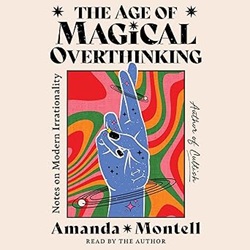
 The Age of Magical Overthinking
The Age of Magical OverthinkingNotes on Modern Irrationality
Review posted July 31, 2024.
Simon & Schuster Audio, 2024. 6 hours, 5 minutes.
Review written written July 22, 2024, from a library eaudiobook.
Starred Review
2024 Sonderbooks Standout:
#4 More Nonfiction
I got to hear Amanda Montell speak at George Mason University's Fall for the Book festival a few years ago. I purchased her book Cultish and thought it was wonderful and insightful, so I was very happy to listen to her latest offering. My only regret is that I listened to it instead of reading the print copy, because then I would have retained more, and I could have given you pithy quotations from each chapter.
The "Magical Overthinking" she refers to in the title is logical fallacies and cognitive biases - as applied to our everyday lives.
She's more interested in how the "sunk cost fallacy" keeps a person in a bad relationship than about how you might throw good money after bad - she applies these cognitive biases to our relationships and daily decisions.
But I like the way Amanda Montell explores all sides of each cognitive bias, including bringing up scholars who suggest that sometimes staying longer in a "bad" relationship can be a good thing. She doesn't make any of the issues sound cut-and-dried, but explores ideas and asks questions. She includes stories from her own life - including the abusive relationship she got pulled into as a teen.
Relationships aren't the only thing she talks about. There's the halo effect of celebrities. Another is nostalgia and how we don't necessarily think realistically about the past, and how that can affect our decisions. And honestly, if I had the print book in front of me, I'd now go back and list each fallacy. (My complaint being that it didn't have chapter titles - each chapter was about a different fallacy.)
She talks about the thought patterns we fall into with lots of compassion, and plenty of insight. And helps open our eyes to the ways they might not be as logical as we think.
